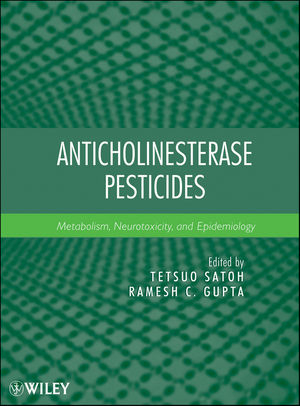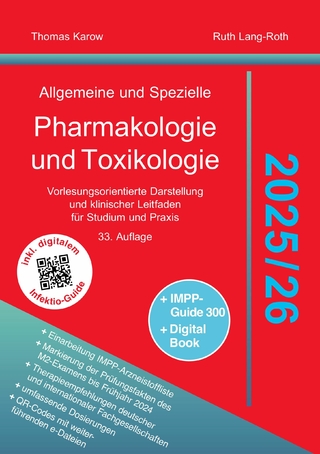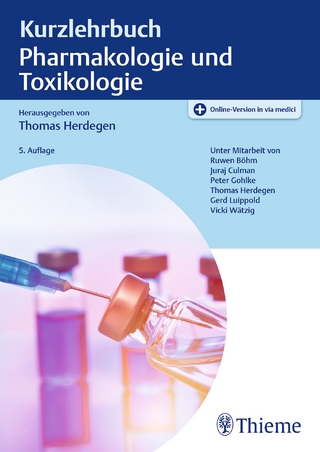
Anticholinesterase Pesticides
John Wiley & Sons Inc (Verlag)
978-0-470-41030-1 (ISBN)
This book offers an important reference source about the most common classes of pesticides for researchers engaged in the area of neurotoxicology, metabolism, and epidemiology. The book presents details about thorough characterization of target and non-target enzymes and proteins involved in toxicity and metabolism; and epidemiology of poisonings and fatalities in people from short- and long- term exposures to these pesticides in different occupational settings on an individual country basis as well as on a global basis. The early portion of the book deals with metabolism, mechanisms and biomonitoring of anticholinesterase pesticides, while the later part deals with epidemiological studies, regulatory issues, and therapeutic intervention.
TETSUO SATOH is Professor Emeritus of Chiba University and Director of the Research Institute at NPO-HAB Research Organization. He received the 2007 International Union of Toxicology (IUTOX) Merit Award in recognition of his significant international contributions to the field of toxicology. Dr. Satoh is also the recipient of the 2010 Education Award of the Society of Toxicology in the United States. Professor Satoh has had a long and prestigious career as one of the international leaders in the science of toxicology. He has published approximately 310 scientific articles and thirty reviews. He has organized a number of important international, national and regional scientific congresses, including several sponsored by IUTOX, ASIATOX, as well as the Japanese Society of Toxicology. RAMESH C. GUPTA is Professor and Head of the Toxicology Department at Murray State University. He is the former president of the American Academy of Veterinary and Comparative Toxicology (AAVCT), and has more than 300 publications to his credit, along with fifty book and encyclopedia chapters as well as five major books. Currently, he holds active membership in ten professional societies and serves as a guest editor of the journal Toxicology and Applied Pharmacology. Dr. Gupta is the recipient of the Distinguished Researcher Award in 2006 from Murray State University, and is internationally known for his research in the field of pesticides and experimental brain research.
Foreword (Donald J. Ecobichon). Section I.
1. Introduction (Tetsuo Satoh, Ramesh C. Gupta).
Section II: Metabolism and Mechanisms.
2. ACETYLCHOLINESTERASE AND ACETYLCHOLINE RECEPTORS: BRAIN REGIONAL HETEROGENEITY (Haruo Kobayashi, Tadahiko Suzuki, Fumiaki Akahori and Tetsuo Satoh).
3. GENOMIC IMPLICATIONS OF ANTICHOLINESTERASE SENSITIVITIES (Jonathan E. Cohen, Gabrial Zimmermann, Alon Friedman and Hermona Soreq).
4. BUTYRYLCHOLINESTERASE: OVERVIEW, STRUCTURE AND FUNCTION (Oksana Lockridge, Ellen G. Duysen and Patrick Masson).
5.CARBOXYLESTERASES:OVERVIEW, STRUCTURE, FUNCTION AND POLYMORPHISM (Masakiyo Hosokawa and Tetsuo Satoh).
6. CARBOXYLESTERASES IN THE METABOLISM AND TOXICITY OF PESTICIDES (Colin J. Jackson, Juan Sanchez-Hernandez, Craig E. Wheelock and John G. Oakeshott).
7. THE METABOLIC ACTIVATION AND DETOXICATION OF ANTICHOLINESTERASE INSECTICIDES (Janice E. Chambers, Edward C. Meek and Matthew Ross).
8. PARAOXONASE 1: STRUCTURE, FUNCTION AND POLYMORPHISMS (Lucio G. Costa, Clement E. Furlong).
9. LONG-TERM NEUROTOXICOLOGICAL EFFECTS OF ANTICHOLINESTERASES AFTER EITHER ACUTE AND CHRONIC EXPOSURE (Angelo Moretto, Manuela Tiramani and Claudio Colosio).
10. MOLECULAR TOXICOLOGY OF NEUROPATHY TARGET ESTERASE (Yi-Jun Wu and Ping-An Chang).
11. DETOXICATION OF ANTICHOLINESTERASE PESTICIDES (Miguel A. Sogorb and Eugennio Vilanova).
Section III: Toxicity and Biomonitoring.
12. INVOLVEMENT OF OXIDATIVE STRESS IN ANTICHOLINESTERASE PESTICIDES TOXICITY (Dejan Milatovic, Ramesh C. Gupta, Snjezana Zaja-Milanovic, Gregory Barners and Michael Aschner).
13.CENTRAL MECHANISMS OF SEIZURES AND LETHALITY FOLLOWING ANTICHOLINESTERASE PESTICIDE EXPOSURE (Andrzej Dekundy and Rafal M. Kaminski).
14. APOPTOSIS INDUCED BY ANTICHOLINESTERASE PESTICIDES (Qing Li).
15. GENE EXPRESSION (Shirin Pournourmahammadi and Mohammad Abdollahi).
16. ORGANOPHOSPHATES AS ENDOCRINE DISRUPTORS (Shigeyuki Kitamura, Kazumi Sugihara, Nariaki Fujimoto and Takeshi Yamazaki).
17. DEVELOPMENTAL NEUROTOXICITY OF ANTICHOLINESTERASE PESTICIDES (John Flaskos and Magdalini Sachana).
18.TOXICITY OF ANTICHOLINESTERASE PESTICIDES IN NEONATES AND CHILDREN (Diane Rohlman and Linda McCauley).
19. NEUROTOXICITY OF ORGANOPHOSPHATES AND CARBAMATES (Kiran Dip Gill, Govinder Flora and Swaran J.S. Flora).
20. BIOMONITORING OF PESTICIDES: PHARMACOKINETICS OF ORGANOPHOSPHORUS AND CARBAMATE INSECTICIDES (Charles Timchalk).
21. NOVEL BIOMARKERS OF ORGANOPHOSPHATE EXPOSURE (Tetsuo Satoh, Salmaan H. Inayat-Hussain, Michihiro Kamishima and Jun Ueyama).
22. BIOMARKERS OF CARCINOGENESIS IN RELATION TO PESTICIDES POISONING (Manashi Bagchi, Shirley Zafra-Stone, Francis C. Lau and Debasis Bagchi).
23. ANTICHOLINESTERASE PESTICIDES INTERACTION (Ramesh C. Gupta and Dejan Milatovic).
24. INTERACTION OF ANTICHOLINESTERASE PESTICIDES WITH METALS (Jitendra K. Malik, Avinash G. Telang, Ashok Kumar and Ramesh C. Gupta).
Section IV: Epidemiological studies.
25. GLOBAL IMPACT (Claudio Colosio, Francesca Vellere and Angelo Moretto).
26. CHILE (Floria Pancetti, Muriel Ramirez and Mauricio Castillo).
27. CHINA (Yueming Jiang).
28. EGYPT (Sameeh A. Mansour).
29. GREECE (Maria Stefanidou, S. Athanaselis, C. Spiliopoulou and C. Maravelias).
30. INDIA (Pawan K. Gupta).
31. IRAN (Mohammad Abdollahi).
32. ISRAEL (Yoram Finkelstein).
33. JAPAN (Takemi Yoshida and Yumiko Kuroki).
34. KOREA (Hyung-Keun RoBum Jin Oh, Mi-Jin Lee and Joo-Hyun Suh).
35. MEXICO (Betzabet Quintanilla-Vega, Norma Pérez-Herrera and Elizabeth Rojas-Garcia).
36. SERBIA (Milan Jokanović, Biljana Antonijević and Slavica Vučinić).
37. SPAIN (Antonio F. Hernández, Tesifón Parrón, José L. Serrano and Porfirio Marín, on behalf of the ESPAPP group).
38. TAIWAN (Tzeng Jih Lin,Dong-Zeng Hung, Jin-Lian Tsai, Sheng-Chuan Hu and Jou-Fang Deng).
39. THAILAND (Winai Wananukul).
40. TURKEY (Ismet COK).
41. U.S.A. (Anna M. Fan).
Section V.
42. Regulatory Aspects (Kai Savolainen).
Section VI.
43. Medical Treatment of Poisoning with Organophosphates and Carbamates (Milan Jokanović).
| Erscheint lt. Verlag | 2.2.2011 |
|---|---|
| Verlagsort | New York |
| Sprache | englisch |
| Maße | 224 x 285 mm |
| Gewicht | 1801 g |
| Themenwelt | Studium ► 2. Studienabschnitt (Klinik) ► Pharmakologie / Toxikologie |
| Studium ► Querschnittsbereiche ► Epidemiologie / Med. Biometrie | |
| Naturwissenschaften ► Biologie | |
| Naturwissenschaften ► Chemie | |
| Technik | |
| ISBN-10 | 0-470-41030-2 / 0470410302 |
| ISBN-13 | 978-0-470-41030-1 / 9780470410301 |
| Zustand | Neuware |
| Haben Sie eine Frage zum Produkt? |
aus dem Bereich


